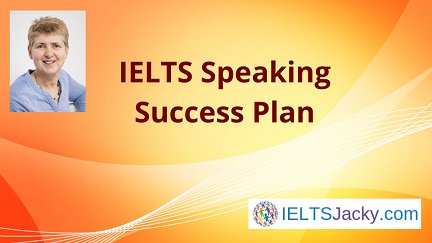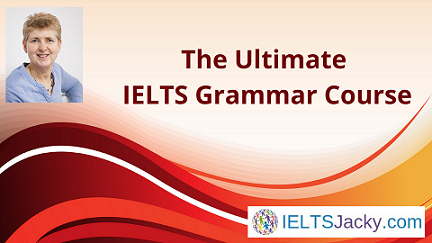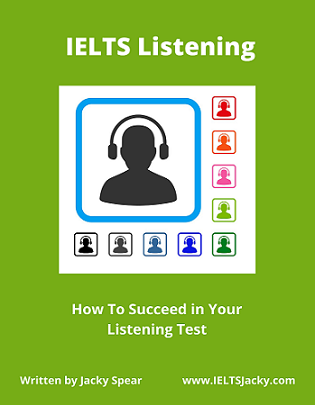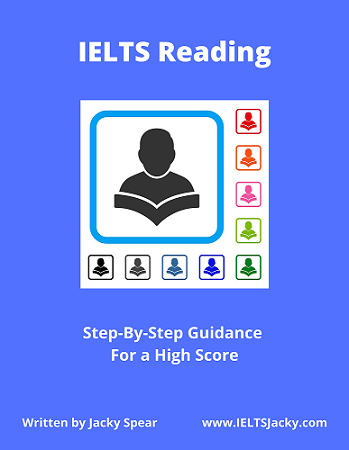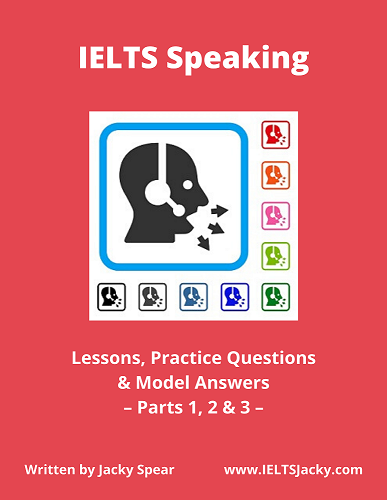IELTS
Listening Test Sample
Short Answer Question
The IELTS
Listening test sample in this lesson is a short answer question. These come up
regularly in the exam and can appear in any section of the test. They are
particularly common in Section 2 which will be a monologue set in an everyday social context, for example, a
welcome talk for new college students.
You must listen to the recording and write a short answer in each blank space provided. Sometimes, more than one answer will be required, for example,
What are the TWO major concerns new students have regarding accommodation?
This lesson includes:
- Sample questions
- Strategy & tips
- Vocabulary
- Practice question
- Answers
Here are two IELTS Listening
test sample questions to give you an idea of what to expect.
The first is from a past test paper and the second has been created specifically to teach you the strategy for answering this type of question and to illustrate some tips.
IELTS Listening Test Sample – Question 1
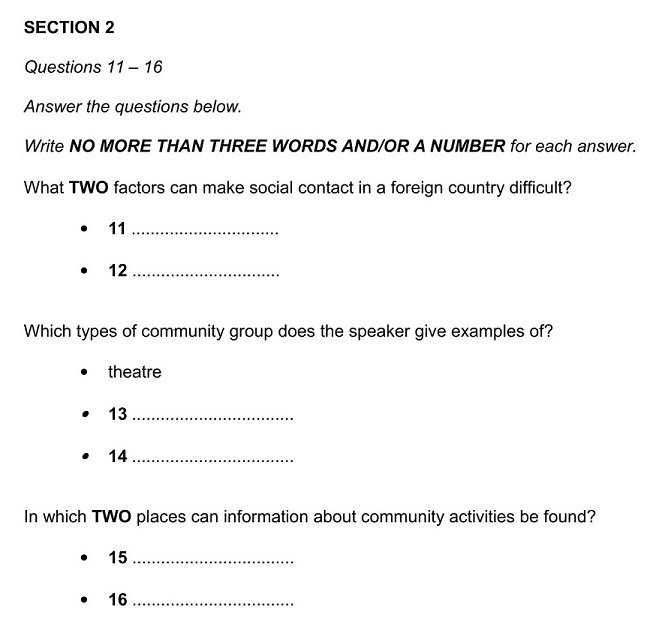
Source: Official IELTS website www.ieltsessential.com
IELTS Listening Test Sample – Question 2
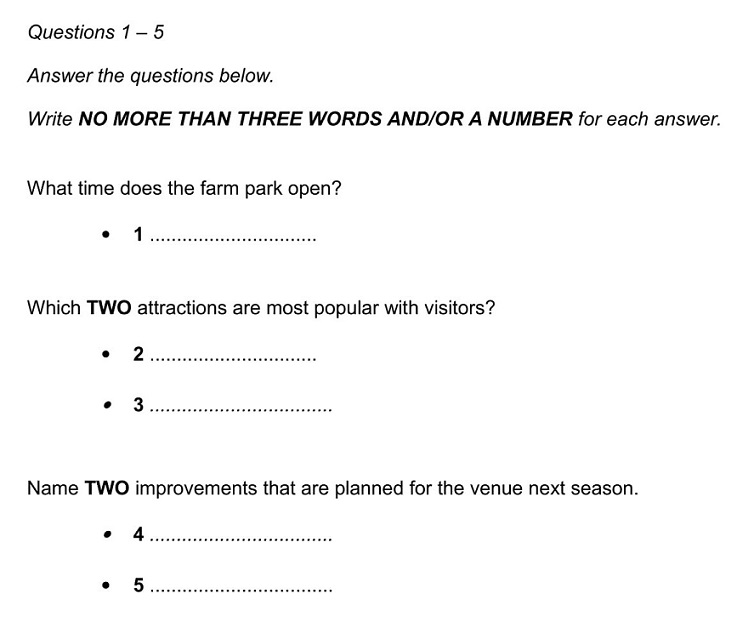
We’ll be using this second example as our IELTS Listening test sample question to practice the strategy and tips I’m about to show you.
Strategy & Tips
You will have a short time to prepare before the speakers begin talking. Use this time to familiarise yourself with the question and focus your mind on what you need to listen out for.
1) Read the instructions
Read the instructions
carefully, paying particular attention to how many words you are allowed to
write for the answer as this does vary.
The instructions for our sample question state that you must,
Write NO MORE THAN THREE WORDS AND/OR A NUMBER for each answer.
If you write more than three words, your answer will be marked incorrect even if the information you give is correct.
Instructions do vary and the limit could be TWO WORDS AND/OR A NUMBER or ONLY ONE WORD, so don’t get caught out.
2) Answer order
The answers will come in the
same order in the recording as they are listed in the question so, for this question,
you will hear answer 1 first, then answer 2 and so on. This makes it easier
to pick out the answers than if they were in a random order.
3) Predict
the answers
Try to predict what the answers might be. This will focus your mind on what to listen out for in the recording.
Occasionally, you’ll be able to predict the actual word but mostly it’s one or more of these things that you’ll be able to determine:
- The type of information required, e.g. name, date, time, phone number, address, price.
- The type of word required, e.g. noun, adjective, verb.
Any clues you can get will help you to understand the audio and identify the information needed for the answers.
Have a go at predicting some of the answers in our short answer question. Then have a look at my predictions below.
Here are the questions:
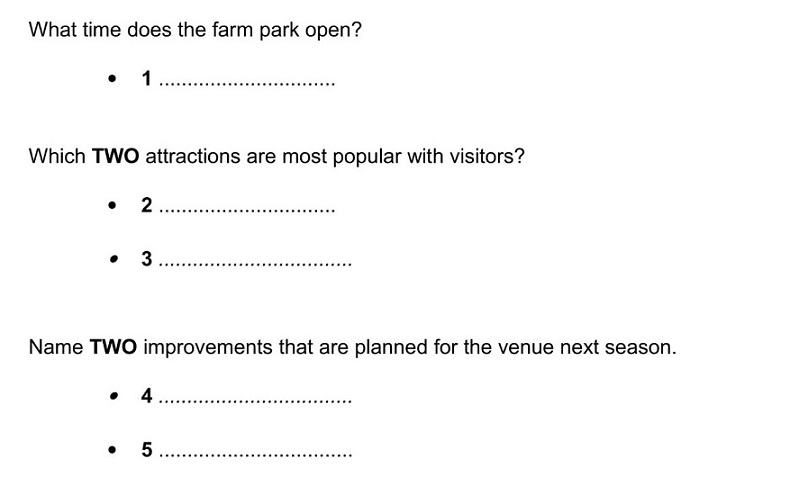
There aren't enough clues in the questions in this instance to guess any of the words but we can make these predictions:
Predictions
1 – a time
2 to 5 – a noun (& adjective?)
4) Synonyms and paraphrasing
Synonyms and paraphrasing will be used extensively in the recording. So, you will not only be listening for the exact words that are used in the questions but also, different words and phrases that have the same meaning.
In your preparation time, scan the questions and underline key words that are likely to be replaced by synonyms or paraphrased. Then, quickly think of words that might be used instead.
I’ve underlined some important key words in our practice question. Can you think of some synonyms for them or ways the information might be paraphrased?
- What time does the farm park open?
- Which TWO attractions are most popular with visitors?
- Name TWO improvements that are planned for the venue next season.
We’ll look at the synonyms and paraphrasing that have actually been used when we review the answers.
5) Problematic vocabulary
There are 6 types of vocabulary that can cause particular problems for students and some of them are regularly used in short answer questions. The 6 types are:
- Time
- Numbers
- Prices
- Dates
- Letters
- Addresses
You must be able to recognise them in speech and to write them correctly in your answers.
I’ve written a whole lesson on this topic, including 8 listening exercises to help you recognise & learn these types of vocabulary. Follow this link to the lesson: Vocabulary Lesson & Exercises
6) Watch out for distractors
The examiners may try and catch you out with distractors. A distractor is a word or a phrase that changes or corrects the original piece of information given. So, you may be given an answer and then have it taken away again.
Here are some sample sentences containing distractors. I’ve highlighted the relevant words.
- For most of the year, we are open from 9.30 a.m. to 5.30 p.m. but now that the dark days of December have arrived, we welcome visitors from 10 a.m. and close at 4 o’clock.
- The birds of prey have long been our favourite display with visitors. However, this year the sheep dog trials have proved even more popular.
- Entrance price was £6.50 per person until May 1st when it increased by 20p to £6.70.
The use of ‘but’ and ‘however’ are particularly common distractors but there are many different words and phrases that can be used to change or correct a piece of information so be alert for them.
7) Guess if necessary
My final tip is to never leave a blank space on the answer sheet. If you miss an answer, take an educated guess. This gives you at least some chance of getting it right. Don’t stress about a missed answer or it will affect your ability to answer the next set of questions. Just make your choice and move on.
Practice Activity
It’s now time for you to practice using this strategy on our sample question. Here it is again.
IELTS Listening Test Sample Question

Listen to this recording and identify the missing words. Refer back to the strategy as you need to and keep the predictions in mind. As you’re listening, remind yourself that you are not looking for the exact words as in the question but the same meaning.
When you’ve completed the practice activity, go through the answers below.
IELTS Listening Test Sample Recording – Short Answer
Answers
Here are the correct answers. The words in brackets are correct but optional.
Answers:
1 9.30
(a.m./am)
2 (new) boating lake
3 (miniature) steam train
4 (trout) fishing lake
5 (outdoor) trampolines
We’ll now look at them
in context and examine the language that has
been used, especially synonyms and paraphrasing.
Answer 1: 9.30 (a.m./am)
Here’s the question followed by the sentence of the recording the answer appears in:
Question:
What time does the farm park open?
Recording:
Be at the gates at 9.30 when Farmer Tom unlocks, and you can be the first visitors inside.
Synonym used:
open à unlocks
This is a typical example of how information will be paraphrased in the recording. The same information is expressed in two very different ways in the questions and the audio text.
Answers 2 & 3: (new) boating lake & (miniature) steam train
Here’s the question followed by the sentence of the recording the two answers appear in:
Question:
Which TWO attractions are most popular with visitors?
Recording:
Voted favourite feature for the past five years, our pet area has been knocked off pole position this year by a new boating lake and the miniature steam train.
Synonyms used:
attractions à feature
most popular à favourite
Did you spot the phrase that acts as a distractor?
knocked off pole position
The speaker states that the pet area has been the favourite feature for the past five years but then says that this situation has changed. It’s very easy to get caught out by sentences like this so listen very carefully.
Answers 4 & 5: (trout) fishing lake & (outdoor) trampolines
Here’s the question followed by the section of the recording the two answers appear in:
Question:
Name TWO improvements that are planned
for the venue next season.
Recording:
We love it that many of our guests come back time and time again and we’re always working to develop the park for the future. Over this winter, we’ll be digging and stocking a trout fishing lake. You can bring your own rod or hire one on-site. We also intended to install a bouncy castle until a visitor survey revealed that outdoor trampolines would be far more popular so we’re going to give you what you’ve asked for.
Synonyms & paraphrasing used:
improvements à develop
planned à intended
next season à over the winter
The second sentence also contains a distractor – until.
The other clue that ‘bouncy castle' is not the second answer is the use of the past tense – ‘intended’. They had planned to install a bouncy castle but the situation changed.
That's all the answers done. I hope you found working through this IELTS Listening test sample question helpful. Now practice using this strategy with short answer questions from past papers. It’s only with practice that your skills will improve and you’ll get the score you need in your test.
You'll find lessons on how to answer other types of Listening questions in the menu below.
Want to watch & listen to this lesson?
Click on this video.
Like this page?
IELTS Listening – All Lessons
IELTS Listening Test – Understand the format & question types. Know what skills are assessed. Also, discover 3 important marking tips.
Listening Strategies – Learn 3 essential listening strategies – question analysis, answer prediction & how to use keyword clues.
Listening Skills – Learn the 4 key listening skills needed for a high score highly. Examples from real questions.
Listening Exercises – 8 listening exercises to help you recognise & learn vocabulary for 6 common topics – time, numbers, prices, dates, letter names & addresses.
The 10 Question Types – Examples of all 10 types of Listening questions. Learn how to recognise & understand them. Links to 10 step-by-step lessons.
Listening Tips – Top 10 tips to bring you success in your Listening test. Essential information you need to know to achieve a high score.
How to Improve Your Listening Skills – 6 simple strategies essential for achieving a high score in the test.
Listening Practice – 4 practice techniques to develop your listening skills
Map & Plan Vocabulary – Learn the vocabulary you need for your test. 5 maps & plans with sample sentences containing common vocabulary of location & direction.
Listening Practice Samples – Short activities to improve your listening skills & help you learn topic vocabulary.
Genuine Full Practice Tests:
The 10 Question Types
Click the links below to learn how to answer each type of question.
All these lessons include IELTS Listening test sample questions for you to learn from.



